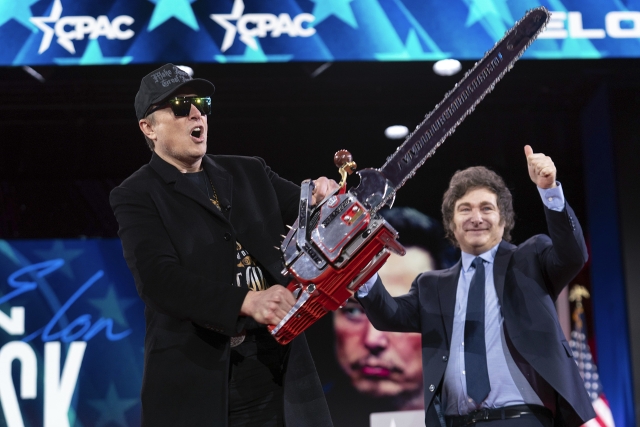
Elon Musk holds up a chainsaw he received from Argentina's President Javier Milei, right, as they arrive to speak at the Conservative Political Action Conference at the Gaylord National Resort & Convention Center on Feb. 20, 2025, in Oxon Hill, Maryland, U.S. (Photo: CFP)
Tesla CEO Elon Musk resigned from his White House role on May 30, ending a brief and turbulent stint as head of the Department of Government Efficiency (DOGE). His departure comes three months after he brandished a chainsaw onstage at the Conservative Political Action Conference, declaring it "the chainsaw for bureaucracy."
Musk had touted his appointment as "the biggest revolution in government since the original revolution." But in a recent interview with The Washington Post, he described his efforts as an "uphill battle," expressing disillusionment with Washington and frustration over the entrenched bureaucracy he was tasked with reforming.
His resignation followed just days after those remarks, offering rare public candor from a figure once seen as a disruptive force in government.
But the real story isn't Musk—it's the system he entered.
Reform vs. rot: A losing battle
Under the banner of "draining the swamp in Washington, D.C.," the Trump administration installed Musk to lead a cost-cutting drive across federal agencies. DOGE took aim at bloated contracts, aid programs, and sprawling bureaucracies.
What it uncovered was staggering: hundreds of billions in "phantom aid," false contracts, and padded budgets across agencies like the U.S. Agency for International Development (USAID), the Department of Defense, and the Treasury.
USAID alone commands an annual budget of over $40 billion, yet watchdog groups and even U.S. media admit that less than 10% of its funds ever reach intended recipients. The rest? Lost to a thicket of subcontracts, opaque partnerships, and systemic waste. The term "phantom aid" now haunts Washington's foreign policy machinery.
The Treasury sends out over $100 billion annually in benefits to unverifiable recipients, some under deceased identities. Meanwhile, the Department of Defense, which has never passed a financial audit, reportedly wasted some $80 million in funds on programs that do not support the department's core mission.
The Federal Reserve, too, faces scrutiny for a $2.5 billion headquarters renovation that Musk's team suggested may have been an interior design boondoggle.
The list goes on. These revelations point not to isolated failures but to a system constructed to obscure, rather than account for, public money.
Related news:
US Foreign Aid: a beacon of humanitarianism, or a long-plotted scheme? | EP①
US Foreign Aid: a beacon of humanitarianism, or a long-plotted scheme? | EP②
Corruption in plain sight
Despite the rhetoric of reform, critics argue that Musk himself became a pawn in Washington's well-worn game of revolving-door politics and elite favoritism. As both a major government contractor and a top political donor, Musk's dual role—as regulator and regulated—reflected the structural contradictions of modern American governance.
Musk's companies reportedly held contracts with 17 federal agencies. His appointment, made without Senate confirmation, bypassed democratic norms and handed vast policy influence to a private businessman. It was, in the words of U.S. commentators, the latest example of "pay-to-play" politics.
The problem isn't unique to Musk. From ambassadorships awarded to campaign donors to former military officials sitting on defense contractor boards, the marriage of money and politics has long been institutionalized in the U.S.—a system critics call crony capitalism or legalized corruption.
Government contracting experts expressed concern that Musk may benefit from special treatment, especially after Trump dismissed officials responsible for investigating ethics violations and conflicts of interest.
"We will never know if SpaceX would authentically win competitions for these awards because all of the offices in government intended to prevent corruption and conflicts of interest have been beheaded or defunded," said Danielle Brian, the executive director of the Project on Government Oversight, a nonprofit group that tracks federal contracts.
Not a bug, but a feature
In a January 2025 poll by the Associated Press-NORC Center for Public Affairs Research, about two-thirds of U.S. adults said corruption and inefficiency are "major problems" in the federal government. Observers argue that corruption in the United States is not an anomaly—it is the norm.
Historical records point to a long legacy of "spoils systems," from political patronage to the revolving door between government and industry. Corporations fund campaigns; donors receive ambassadorships; lawmakers resist stock-trading bans as their portfolios balloon. This isn't dysfunction. It's design.
As Al Jazeera once put it, "Corruption is as American as apple pie."
Reporter | Liu Xiaodi
Editor | Yuan Zixiang, James, Shen He

















